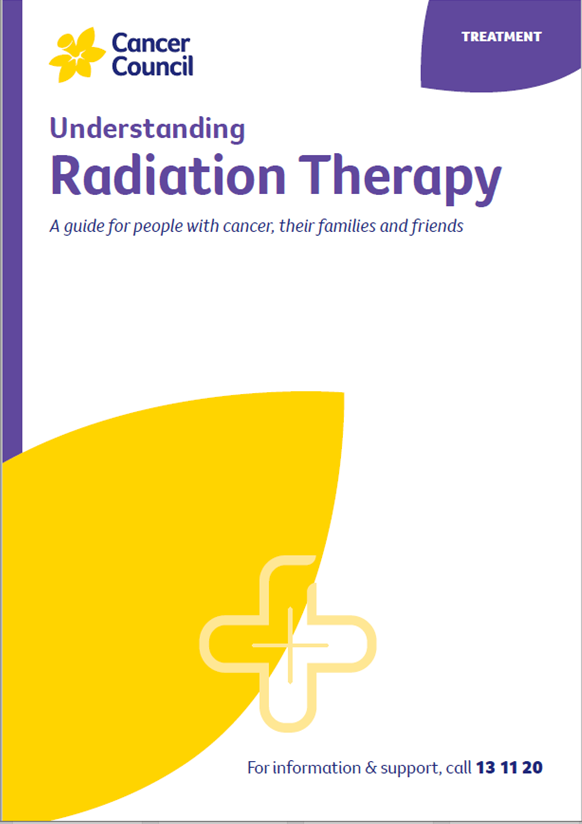- Home
- Thyroid cancer
- Treatment
- External beam radiation therapy
External beam radiation therapy
External beam radiation therapy (EBRT) may be called external beam radiotherapy or just radiation therapy. It directs high-energy radiation beams precisely to the affected area, to kill cancer cells or damage them so they cannot grow, multiply or spread.
Learn more about:
- When is external radiation therapy used?
- Planning treatment
- Having treatment
- Side effects of external radiation therapy
- Video: What is radiation therapy?
When is external beam radiation therapy used?
Most thyroid cancer does not need EBRT, but it may be recommended in particular circumstances:
- after surgery and RAI treatment if the cancer has not been completely removed or if there is a high risk of the cancer returning (recurrence)
- to help control medullary or anaplastic thyroid cancer (because these types do not respond to RAI)
- as ongoing or palliative treatment to relieve symptoms such as pain caused by cancer that has spread to nearby tissue or structures. This is very rarely needed.
Planning treatment
EBRT needs to be carefully planned to ensure that enough radiation reaches the cancer, while as little radiation as possible reaches healthy tissues and organs.
Before the treatment starts, the radiation therapist will take CT scans to work out the exact area to be treated, and may make small marks or tattoos on your skin. This ensures the same part of your body is targeted during each treatment session.
You may also be fitted for a plastic mask to wear during treatment. This will help you stay still so that the radiation is targeted at the same area of your neck during each session. You can see and breathe through the meshed mask, but it may feel strange and uncomfortable at first.
The radiation therapy team can help you manage any discomfort, so let them know if you are having trouble or feel anxious about it.
Having treatment
EBRT is usually personalised. Most people will have treatment 5 days a week over a period of one to several weeks. However, treatment is different for everyone so this can vary, sometimes a lot. Treatment sessions usually take about 10 minutes, but it can take up to 30 minutes to position the machine correctly.
You will lie very still on a table as the machine moves around you but does not touch you. The radiation session is painless and you won’t feel anything happening to you.
Side effects of external beam radiation therapy
Many people develop side effects during radiation therapy to the thyroid. Common side effects include:
- feeling tired
- difficulty swallowing
- sore throat
- dry mouth
- red, dry, itchy, sore or ulcerated skin.
Most side effects will disappear within a few weeks or months. Your treatment team can help you prevent or manage any side effects if they happen.
Video: What is radiation therapy?
Watch this short video to learn more about radiation therapy.
→ READ MORE: Chemotherapy for thyroid cancer
Podcast: Making Treatment Decisions
Listen now
More resources
A/Prof Diana Learoyd, Endocrinologist, GenesisCare North Shore, Faculty of Medicine and Health, University of Sydney, NSW; Emeritus Professor Leigh Delbridge AM, The University of Sydney, Thyroid Surgeon, The Mater and North Shore Private Hospitals, NSW; Prof Ruta Gupta, Tissue Pathology and Diagnostic Oncology, Royal Prince Alfred Hospital and The University of Sydney, NSW; Susan Leonard, Cancer Nurse Coordinator Thyroid and Brachytherapy, Cancer Care Services, Royal Brisbane and Women’s Hospital, QLD; Dr Dean Lisewski, Endocrine and General Surgeon, Fiona Stanley Hospital and St John of God Hospital, Murdoch, WA; Caitriona Nienaber, 13 11 20 Consultant, Cancer Council WA; Jonathan Park, Consumer; A/Prof David Pattison, Deputy Director and Senior Staff Specialist, Department of Nuclear Medicine and Specialised PET Services, Royal Brisbane and Women’s Hospital and School of Medicine, University of Queensland, QLD; Prof Bruce Robinson, Endocrinologist, Co-Head, Cancer Genetics, Kolling Institute of Medical Research, The University of Sydney and Royal North Shore Hospital, NSW; Marissa Ryan, Team Leader (Cancer) Pharmacist, Princess Alexandra Hospital, Brisbane, QLD.
View the Cancer Council NSW editorial policy.
View all publications or call 13 11 20 for free printed copies.
Need to talk?
Support services
Coping with cancer?
Ask a health professional or someone who’s been there, or find a support group or forum
Looking for transport, accommodation or home help?
Practical advice and support during and after treatment
Cancer information
Making cancer treatment decisions
Decision-making steps, consent and second opinions
What is radiation therapy?
Key questions about radiation therapy as part of cancer treatment

